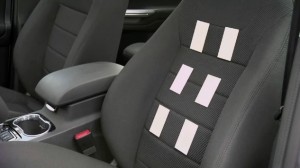 Ford Motor Co. is building on its in-car health monitoring initiative by teaming with Microsoft and Healthrageous to research how people can monitor their health and promote wellness with connected devices while in their vehicles. The companies are taking advantage of the spotlight at the massive 2012 International CES trade show in Las Vegas this week to show off a prototype called "the car that cares."
Ford Motor Co. is building on its in-car health monitoring initiative by teaming with Microsoft and Healthrageous to research how people can monitor their health and promote wellness with connected devices while in their vehicles. The companies are taking advantage of the spotlight at the massive 2012 International CES trade show in Las Vegas this week to show off a prototype called "the car that cares."
Healthrageous, a Boston-based producer of online and mobile apps for self-management of chronic diseases and preventive health activities, is embedding its "digital coach" technology into the Microsoft-powered Sync communications and entertainment system now common in Ford vehicles.
"Sync will be Ford's key technology supporting activities in the health and wellness sphere," Gary Strumolo, manager of "infotainment," interiors, health and wellness in the Ford Research and Innovation division, said Wednesday at the CES Digital Health Summit.
Stromolo noted that some people spend dozens of hours a week in their cars, making vehicles a convenient and private environment in which to deliver health and wellness coaching. "It's the only logical place for people to manage their health while on the go," he said.
This new initiative will collaborate with previously announced Ford partnerships to connect health monitoring devices to the onboard Sync computer. The auto-maker already is working with Medtronic to measure blood sugar for people with diabetes and report on serious conditions such as whether a driver is going hypoglycemic or whether a child in the back seat might be going into a diabetic coma rather than merely napping.
"We shouldn't have to worry that we're disconnected from our own health maintenance when we're in our cars," according to Strumolo.
Control is voice-enabled. "[Drivers] never have to take their eyes off the road or their hands off the wheel," Strumolo said.
Ford also is working with IMS Health on an allergy app that can automatically turn a car's climate-control system to recirculate when external pollen is dangerously high or to give the driver an alternative route around an area with poor air quality. "It’s an inherently simple idea that has the potential to change how people interact in the world through their cars," Strumolo said.
As part of the newly announced partnership, Ford owners will be able to upload data from in-vehicle monitors and Healthrageous coaching to Microsoft's HealthVault personal health records platform or the Windows Azure cloud. Though adoption of HealthVault and other PHRs has been slow, Strumolo said this partnership is "full of transformative potential."
One thing Ford will not do is employ Sync to diagnose illnesses, a step that likely would invite scrutiny from the Food and Drug Administration. "There is a line we will never cross," Strumolo said. "It has never been our intention to turn your car into a medical device or a diagnostic system."
A man in attendance who said he was an ophthalmologist asked if the technology could help track the vision of older drivers on behalf of their children who might want their elderly parents to stop driving. Strumolo said that Ford would not invade the driver's privacy.
Strumolo added that he is interested in looking at other "brought-in" devices, such as heart-rate monitors, which MobiHealthNews first reported on last May. "We have to be careful here. We don't want to have the care able to make predictions."
He showed one photo of a prototype heart-monitoring seat Ford is testing in Europe. The data from the seat could create what Strumolo called a "driver workload estimate" to measure stressors that could affect safety. Theoretically, Sync could automatically route calls to voice mail when stress is above a set threshold.

















